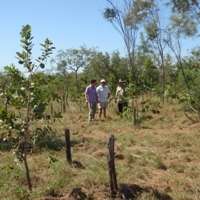Vitamin C-rich native fruit ripe for cash crop study

A wild Australian native fruit with 10 times more vitamin C than oranges and rich in healthy anti-oxidants will be studied by scientists led from The University of Western Australia to help develop as a potentially lucrative international cash crop for Aboriginal communities.
The Kakadu plum, long used by Indigenous people as a source of traditional food and medicine, is currently harvested only in the wild in northern Australia.
However, its growing popularity as a natural source of vitamin C has driven demand, and more than 17 Australian and international companies use it in food and health-care products. Kakadu plums also contain more than 13 times more anti-oxidants than blueberries.
A project funded by the Federal Government's Rural Industries Research and Development Corporation will examine how to grow Kakadu plums in commercial plantations to help Australia's fledgling bush tucker industry expand as a major Aboriginal enterprise.
UWA's Dr Liz Barbour will lead the project, which also involves the Kimberley Training Institute, the Department of Parks and Wildlife, the Northern Territory Government and Charles Darwin University. An Indigenous Steering Committee will oversee their work.
Dr Barbour said commercial Kakadu plum harvesting was an Aboriginal community enterprise in tropical coastal woodlands in Western Australia and the Northern Territory.
However, seasonal variations meant fruit crops sometimes failed due to early ripening or non-fruiting, or were missed because heavy rains at harvest time made the fruit inaccessible. The increasing impact of fire due to climate change was also an issue.
Studies by the Kimberley Training Institute together with Aboriginal communities around Broome have shown that Kakadu plum orchards could grow successfully. These have been planted as "enrichment plantings" in native bush near Aboriginal communities with supplementary irrigation.
"The project aims to create a reliable supply of high-quality fruit by supplementing the wild crop with easily accessible orchards," Dr Barbour said.
"The process of Kakadu plum domestication starts by investigating its genetic make-up and understanding the fruit ripening process. We will work with Aboriginal communities to provide training in collection and to establish plantings in WA and the Northern Territory."
Kakadu plums ripen in January in Western Australia and in May at the onset of the Northern Territory dry season. They have a tart taste and are used to make jams, sauces and juices, and skin and hair care products and vitamin supplements.
Provided by University of Western Australia




















